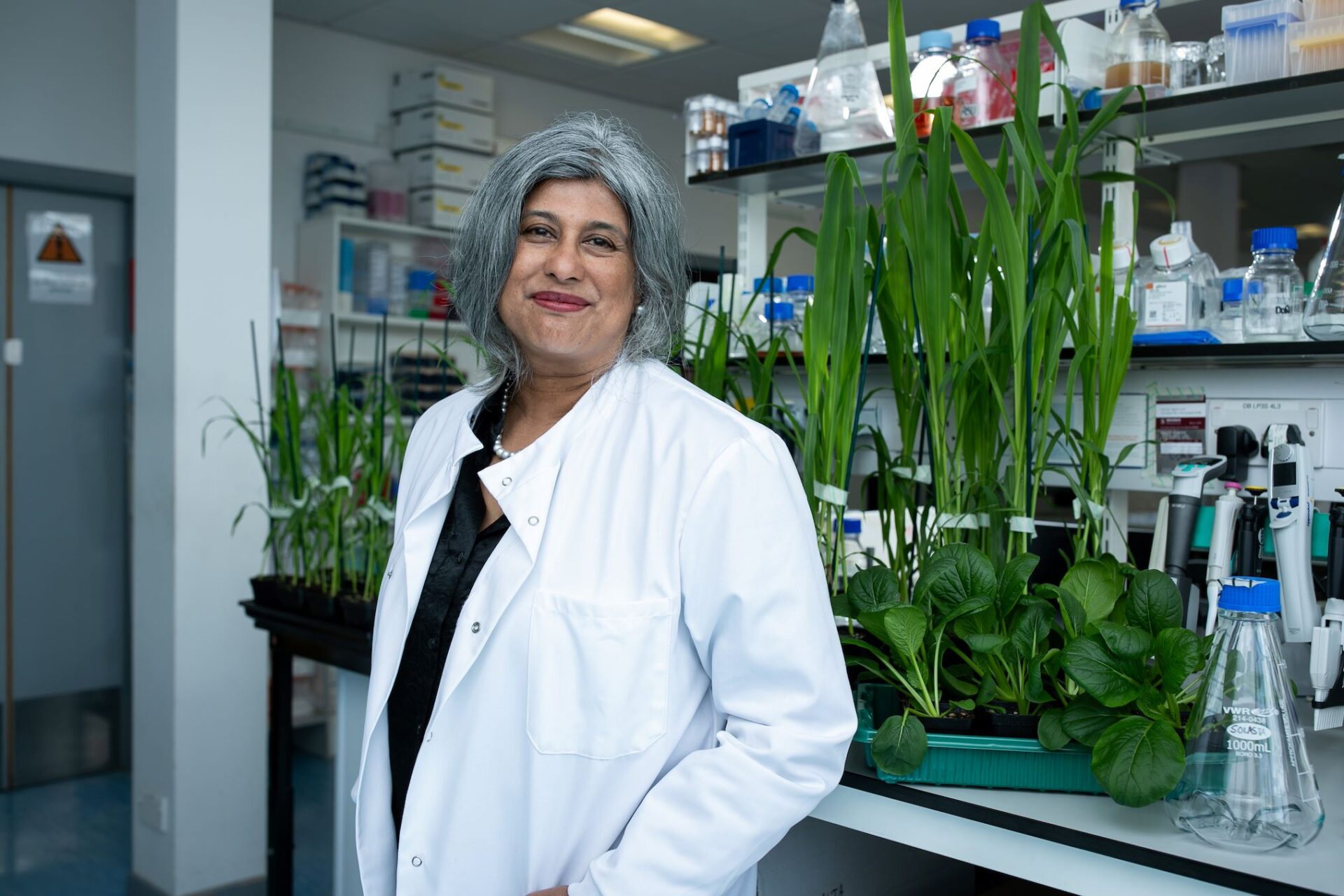[Disclosure: AgFunder is AgFunderNews’ parent company.]
Let’s not sugarcoat the facts: venture capital funding in UK agrifoodtech startups dropped significantly in 2024.
Startups raised just $616 million compared to $1.1 billion in 2023—a 45% year-on-year drop—and $1.3 billion in 2022. Deal count dropped 40% to 113, its lowest point since 2015.
The numbers aren’t a surprise. As AgFunder’s latest report points out, global agrifoodtech investment has been in free fall the last few years, pulled down by the gravity of interest rates, recession, geopolitical tensions, and supply chain vulnerabilities.

However, the UK still ranks among the top five countries globally for agrifoodtech investment, and it is the highest-ranked of all European countries.
“For those companies in our membership who are seeking finance, it’s been a tougher time than I can remember, but I think we’re seeing ‘green shoots of interest,'” says Belinda Clarke, director of nonprofit membership organization and AgFunder report partner Agri-TechE.
For example, she recently sent out a startup deck and had an investor express interest in meeting with the company. “Most of the time in recent years, investors have been saying that startups are too early for them,” she tells AgFunderNews.

Making UK ‘welcoming to overseas investment’
Clarke suggests one reason (among many others) for these new signs of life in UK agrifoodtech investment is the new UK government.
“The British government is all about growth; it’s all about making the UK very welcoming for overseas investors. There is certainly a recognition of the importance of making the UK an easier place to invest, start a company, and do business. And the Chancellor has, just this week, called in a lot of the regulators to try and make it easier for businesses to navigate the British regulatory system.”
Similarly, Hoxton Farms cofounder Dr. Max Jamilly says he is “cautiously optimistic” about UK agrifoodtech investment moving forward, partly due to regulatory changes, not the least those directly impacting his category.
“The government has been very supportive of startups, policy and regulatory changes, and also supportive in providing non-dilutive grants to UK startups building new centers and institutions.”
Hoxton Farms is developing cultivated fat that can, the company claims, enhance the taste of meat alternatives.
Hoxton would certainly benefit from a more efficient regulatory environment, given the complexities at hand for getting cultivated meat products to consumers. The company is currently participating in the UK Food Safety Authority’s new sandbox program, announced a couple weeks ago, to help startups navigate the regulatory landscape.
However, says Jamilly, “What the government gives, the government can take away.”
“We are in the UK, exposed to the broader global economy, where, between tariffs, the threat of more wars, and supply chain issues, agrifood can be badly impacted fairly quickly. And although we’ve had regulatory optimism in the UK, most UK startups look to the US as a target market sooner or later, and there’s so much uncertainty around US regulation over the last couple of months that people are pretty worried about that.”
‘The quality of UK startups is generally quite poor’
Others seem to express more caution than optimism.
For example, the almost 50% drop in funding to UK agrifoodtech investment in 2024 could be partially attributed to questionable guidance from the government, says Antony Yousefian, a partner at London-based nature tech VC firm The First Thirty.
“UKRI [UK Research and Innovation] has sent signals to UK agritech to build robotics, vertical farms, and, recently, alternative protein companies,” he tells AgFunderNews.
“This makes no sense to me, from an overall venture opportunity, as the UK has no industry supply chain for these [areas]. All robotics supply chains are in China, while in the UK we dismantled our greenhouse industry a long time ago.”
Previous UK governments, he adds, have tried to incentivize “high” skilled jobs, using the above categories as a route to do so. Given all of that, “the quality of UK startups is generally quite poor. I’m unsurprised UK agtech funding was down.”

Ag biotech category ‘noticeably muted’
Even so, Yousefian suggests there’s some change afoot for the better in certain areas.
“UK has strong life sciences and biotech,” he says. “Combine these together with ag, and the UK can do very well.”
For example, Clarke points out the emergence of innovations based on a more sophisticated understanding of plant metabolism, such as enhancing photosynthetic efficiency.
“Biologicals are becoming more rigorous and based on a real understanding of the interactions between mechanisms,” she adds.
How such developments influence future funding remains to be seen. UK ag biotech investment has ping-ponged quite a bit over the last five years. It dropped from $70 million in 2020 to $41 million in 2021, then peaked at $143 million in 2022 before dropping more than 60% in 2023 to just $55 million.
In 2024, activity in the category was “noticeably muted” in the UK, with startups raising just $39 million over eight deals, according to AgFunder’s report. For upstream categories—those close to the farm or lab—it was the third best-funded category, behind novel farming systems and innovative food.
For a country with such a strong life sciences prowess, the low numbers are rather alarming. The hope is that legislation such as the Precision Breeding Act, which in a nutshell would make gene-editing of plants and animals legal in the UK, could help drive startup innovation.
Among the category’s top rounds in 2024 were those for microalgae startup MiAlgae ($18 million) and a $14 million raise for Solasta Bio.
Robotics & automation come to Midstream Technologies
The best-funded category in 2024 was Midstream Technologies, which includes food safety and traceability tech, logistics and transport solutions, and processing technology.
The bulk of the category’s total went to one company, Dexory, which makes automation and robotics software for logistics and warehousing. The company raised $80 million in Series B funding in the latter half of 2024.
With Dexory removed, Midstream’s total investment standing drops to fifth place.

Can new regulations boost innovative foods?
Despite raising 64% less than in 2023, Innovative Foods was one of the best performing categories in the UK in 2024. Raising $83 million across 23 deals, rounds for plant-based food maker THIS ($25 million) and food brand Pure Pet Food ($19 million) contributed to the total.
The category, which is dominated by alternative protein companies but also includes other types of novel foods and beverages, has been hit dramatically into the trough of disillusionment thanks to inflated expectations and valuations leading up to the 2021 peak.
In developed markets, the category raised $1.3 billion overall, of which the US accounted for $587 million in 2024.
But a changing regulatory environment in the UK could help some areas of this category, suggests Jamilly at Hoxton Farms. When Brexit officially took place in 2020, Britain was largely following the same regulatory framework as the EU, he says. Since then, the rules have diverged.
“In some cases it was actively and deliberately; in others it was just because the UK, being smaller, can reform policy faster than the EU, so it might have the same direction of travel, it’s just been able to move faster,” says Jamilly.
For example, the Precision Breeding Act made UK policy much more permissive around engineered organisms in food. More recently, the newly formed FSA cultivated meat sandbox is a way of showing regulatory independence while simultaneously advancing startups, he says.

Back to VC’s actual roots
Consensus is gelling these days around the fact that traditional venture capital may not be suitable for agritech categories where quick returns a la B2B SaaS simply aren’t possible.
However, the issue isn’t so cut and dry, according to Clarke.
“For the right deal and the right technology, I think VC still remains a very viable funding stream,” she says. “It’s true that we need a more diverse funding portfolio, and we need to not be quite as reliant on a VC model. But I wouldn’t stop putting agritech SMEs in front of VCs.”
She highlights the UK government’s proposed creation of “pension megafunds.” There are few details on that initiative so far, but it could provide “a really creative way of looking at additional investment opportunities,” she says. “It speaks to this agenda of so-called ‘patient capital.'”
For Jamilly, the trick is not to reframe VC but instead go back to its true roots. In the 1970s, for example, “high-risk, high-return” companies tended to be recipients of VC money. Biotech giant Genentech is one such example.
“The kind of VC that works the best for agtech is relatively patient capital because this space takes longer to go to market, but the return can be enormous when it does,” he explains.
Such capital understands the regulatory risks involved in agritech developments and how to underwrite them. It also has a grasp of the complex distribution and payer models and the complexities of the markets, he adds.
“The good thing is that more and more investors are coming to understand that what we really need now is a demonstration of some VC-scale value creation that is really good, and that will prove empirically that VC is suitable for agtech. Now we need agtech-friendly funds to take scale-ups and growth stage startups all the way to exit.”





